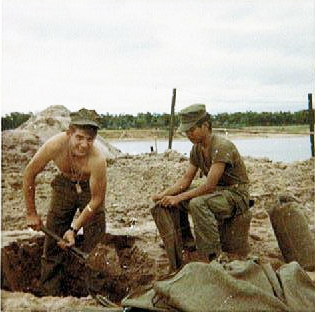
Passing Time: Memoir of a Vietnam Veteran against the War (McFarland, 303 pp. $19.99, paperback; $10.99, Kindle) is a newly published revised edition of W.D. Ehrhart’s classic 1989 memoir of his time in the Vietnam War and a few years after. Ehrhart is considered by many to be the most important American poet to come out of the war. He served thirteen months as a U.S. Marine in South Vietnam.
Passing Time is the second of Ehrhart’s memoir trilogy. The others are Vietnam-Perkasie: A Combat Marine’s Memoir (1983) and Busted: A Vietnam Veteran in Nixon’s America (1995).
Bill Ehrhart enlisted in the Marines right out of high school in the spring of 1966. Since he was only 17, he needed his parents’ signatures to join. He wanted to go to Vietnam, and got his wish, serving a combat-heavy tour based at Con Thien and seeing action throughout I Corps. He recalls a time when he was reading a letter from his mother encouraging him to stop smoking while he was in the middle of an artillery assault.
On one mission Ehrhart moved from one hamlet to another over several hours, blowing up and burning hooches. At the time he hated such actions, but felt as though they were necessary. He had only wanted to do his duty as he had been raised to understand it. Receiving a Purple Heart, he considered it a “booby prize” since all you need to do to get it is “to be in the wrong place at the wrong time.”
After serving in Vietnam the young Marine returned to a country that appeared, in his eyes, to have radically changed. “When I’d gotten back to the States, I discovered that in my absence America had become an alien place in which and to which I no longer seemed to belong.” He volunteered to go back to Vietnam, but was sent to Okinawa and then the Philippines.
Once he was out of the Corps Ehrhart began attending classes at Swarthmore College in his home state of Pennsylvania. He was older than most of his fellow students and soon became aware that he was likely the only Vietnam War veteran at the school.
In college he had a change of heart about the war and his role in it. Large events spurred the changes, such as the May 1970 National Guard shootings at Kent State University and the release of the Pentagon Papers, but he also had reoccurring nightmares of atrocities he had witnessed.

Ehrhart joined the student antiwar movement, he says, when he realized “It was time to stop the war.” Once he became involved, he went all in.
Many of sentences in Passing Time are naturally poetic. Such as:
“The moon was almost full, and the sky was clear, and the trees and buildings cast shadows on the dark earth.”
“As the gray false dawn gave way to a glowing pink fringe on the edge of a cloudless sky….”
“My whole life didn’t really lie in front of me, but rather lay behind me broken and scattered like the bodies of the Vietnamese I had left broken and scattered among the green rice shoots.”
It’s great to see Bill Ehrhart’s work republished by McFarland. His memoirs and poems need to be read as long as there is a memory of America’s participation in war in Vietnam.
–Bill McCloud


